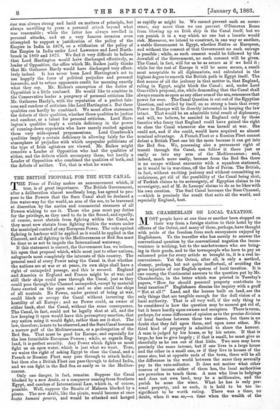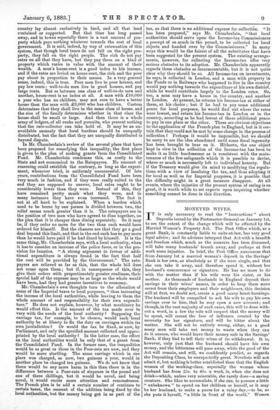MR. CHAMBERLAIN ON LOCAL TAXATION.
MOST people have at one time or another been stopped on their way from a foreign station to their hotel by the officers of the Octroi, and many of them, perhaps, have thought with pride of the freedom from such annoyances enjoyed by Englishmen. To the traveller who has merely to answer the conventional question by the conventional negation the incon- venience is nothing, but to the marketwomen who are bring- ing in their goods, and to the townspeople who have to pay an enhanced price for every article so brought in, it is a real in- convenience. Yet the Octroi, after all, is only a method, clumsy, perhaps, but not quite ineffectual, of avoiding the gross injustice of our English system of local taxation. It is one among the Continental answers to the question put by Mr. Chamberlain, in the letter which was printed in Tuesday's papers, "How far should personal property contribute to local taxation?" Englishmen dismiss the inquiry with a gruff "Not at all!" Land, and the houses built on land, are the only things that are tangible enough for the dull vision of a local authority. That is all very well, if the only thing to be considered is how the question may be soonest got rid of, but it bears hardly upon owners and occupiers. There is room, perhaps, for some differenceof opinion as to the precise division of local burdens between these two classes, but there is no doubt that they fall upon them, and upon none other. No third kind of property is admitted to share the honour. A man is judged by his house, or by his estate. If that is large, he has to give largely ; if that is small, he must give as cheerfully as he can out of that little. Two men may have precisely the same income, but if one lives in a large house and the other in a small one, or if they live in houses of the same size, but at opposite ends of the town, there will be all the difference in the world between the sums they severally pay to the rate-collector. It does not matter what other sources of income either of them has, the local authorities are powerless to touch them. A man who lives in lodgings and does not own, land, may be a millionaire, and the parish be none the wiser. What he has is only per- sonal property, and as such, it is held to be too in- significant to be worth rating. There was a time, no doubt, when it was so,—a time when the wealth of the country lay almost exclusively in land, and all that land contained or supported. But that time has long passed away, and in towns especially there is a vast amount of pro- perty which pays nothing whatever towards the cost of local government. It is said, indeed, by way of extenuation of this system, that though local taxes do not fall on the right pro- perty, they fall on the right people. The rich do not pay rates on all that they have, but they pay them on a kind of property which varies in value with the amount of their wealth. A man's house-rent is a good index to his income, and if the rates are levied on house-rent, the rich and the poor pay about in proportion to their means. In a very general sense, indeed, this is true. Poor men live in poor houses, and pay low rents ; well-to-do men live in good houses, and pay large rents. But as between one class of well-to-do men and another, house-rent is no index at all. A man with £10,000 a year who has no children, may not care to have a better house than the man with .0,000 who has children. Custom determines that they shall live in the same class of house, and the size of the family determines whether in that class the house shall be small or large. And then there is a whole army of lodgers, of all ranks and pursuits, who present nothing that the rate-collector can take hold of. It may be an un- avoidable anomaly that local burdens should be unequally distributed, but the fact that they are unequally distributed is beyond dispute. In Mr. Chamberlain's review of the several plans that have been proposedfor remedying this inequality, the first place is given to the plan of making grants from the Consolidated Fund. Mr. Chamberlain condemns this, as costly to the State and not economical to the Ratepayers. No amount of reasoning could establish the contrary, so long as the experi- ment, whenever tried, is uniformly unsuccessful. Of late years, contributions from the • Consolidated Fund have been very much in fashion, and if they were really suited to the end they are supposed to answer, local rates ought to be considerably lower than they were. Instead of this, they have remained pretty much what they were, and in many instances they have even increased. The fact is not at all hard to be explained. When 'a burden which used to be borne by one person is divided between two, the relief seems much greater than it is. The ratepayers are in the position of two men who have agreed to dine together, on the plea that it is cheaper than dining separately. So it may be, if they order no more for the two than each would have ordered for himself. But the chances are that they go a good deal beyond this limit, and that in the end each has to pay more than he would have paid if he had dined by himself. It is the same thing, Mr. Chamberlain says, with a local authority, when it has to consider an increase of the police force, or in the pro- vision for lunatics. "A strong argument in favour of addi- tional expenditure is always found in the fact that half the cost will be provided by the Government." The rate- payers are relieved so far as this, that the whole bill does not come upon them ; but if, in consequence of this, they give their orders with proportionately greater readiness, their special half of the expense may be as large as the whole would have been, had they had greater incentives to economy.
Mr. Chamberlain's own thoughts turn to the allocation of some of the Imperial taxes to local purposes, "thus increasing the income of the local authorities, while leaving to them the whole amount of and responsibility for their own expendi- ture." He does not explain, however, by what machinery he would effect this. Is the amount of the tax made over to vary with the needs of the local authority ? Supposing the carriage tax, for example, to be chosen, would each local authority be at liberty to fix the duty on carriages within its own jursisdiction I Or would the tax be fixed, as now, by Parliament, and only the specified amount collected and appro- priated by the local authority? In the latter case, the effect on the local authorities would be only that of a grant from the Consolidated Fund. In the former case, the inequalities would be as great as those in the Poor-rate are now, and they would be more startling. The same carriage which in one place was charged, as now, two guineas a year, would in another place be charged ten guineas. We do not know that there would be any more harm in this than there is in the difference between a Poor-rate of sixpence in the pound and one of three shillings, but it would be novel, and being novel, it would excite more attention and remonstrance. The French plan is to add a certain number of centimes to certain taxes, the amount of the addition being fixed by the local authorities, but the money being got in as part of the tax, so that there is no additional expense for collectio.n. "It has been proposed," says Mr. Chamberlain, "that local authorities should serve upon the Income-tax Commissioners a precept of so much in the pound, to be collected for local objects and handed over by the Commissioners." In many ways this would be the fairest of all the substitutes that have been suggested for the present system. The existing arrange- ments, however, for collecting the Income-tax offer very serious obstacles to its adoption. Mr. Chamberlain apparently regards these obstacles as insurmountable, but it is not quite clear why they should be so. All Income-tax on investments, he says, is collected in London, and a man with property in the Funds or in Railways who happened to live in the country would pay nothing towards the expenditure of his own district. while he would contribute largely to the London rates. So, too, a man may have a house in the country, and another in London. At present, he returns his Income-tax at either of them, at his choice; but if he had to pay some additional pence for local purposes, he would find out where the rates were lowest, and return his Income-tax in London or in the country, according as he had fewest of these additional pence to pay in one place or the other. These are obvious objections to the application of the French plan to England, but is it cer- tain that they could not be met by some change in the process of collection ? Perhaps it would be impossible, but we should be sorry to see the idea abandoned until some fiscal ingenuity has been brought to bear on it. Hitherto, the one object kept in view in the collection of the Income-tax has been to make it as little burdensome as is consistent with the main- tenance of the few safeguards which it is possible to devise, where so much is necessarily left to individual honesty. But if the Treasury would give• its mind to modifying the regula- tions with a view of localising the tax, and thus adopting it for local as well as for Imperial purposes, it is possible that the difficulty might in a great measure disappear. At all events, where the injustice of the present system of rating is so great, it is worth while to set experts upon inquiring whether something cannot be done in this direction.















































 Previous page
Previous page